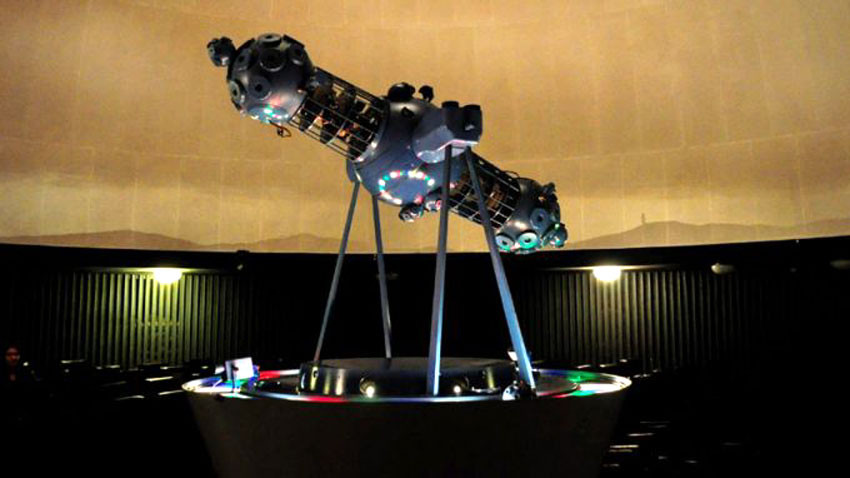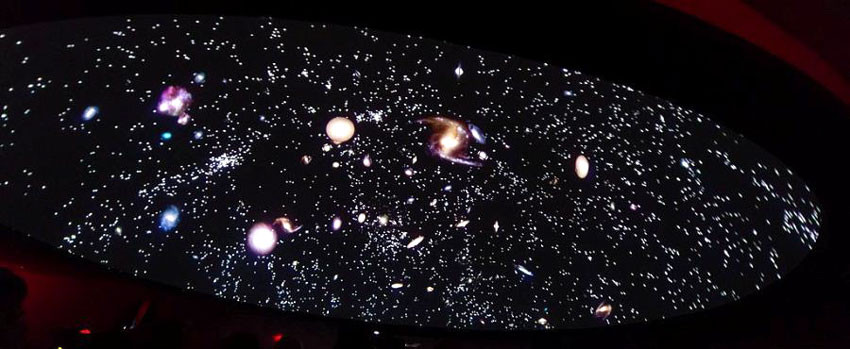In today’s world, we have lost connection with the stars and few people only are able to find the most popular constellations in the night sky. However, there are also people who want to learn more about the planets and the stars and find the secrets of the Universe. The planetariums provide one such opportunity.
The idea of creating planetariums in Bulgaria emerged after the beginning of the Space Age in 1957. The device that designs the night sky and the movements of the planets over the semispherical cupola of the planetarium is also called planetarium, Associate Professor from the Institute of Astronomy of the Bulgarian Academy of Sciences Dimitar Kolev who has worked for 40 years at the National Astronomical Observatory in Rozhen told Radio Bulgaria.
The first planetarium in Bulgaria was homemade. It was unveiled in the town of Dimitrovgrad by amateur astronomer Milko Milanov in 1962.

He used a copper sphere equipped with a powerful lamp and several film strips showing the picture of the night sky. Ten years later the device was replaced by a planetarium produced by Carl Zeiss Company and later another 5 or 6 devices were bought for the purposes of the Bulgarian planetariums.

There are several planetariums in Bulgaria. They are located in the towns of Dimitrovgrad, Smolyan, Varna, Yambol, Stara Zagora and Gabrovo. The first digital planetarium was unveiled in Kamchia resort complex near the coastal city of Varna. A digital planetarium was also built in Bulgaria’s second- biggest city Plovdiv in 2015. However, the guests and the residents of Bulgaria’s capital Sofia were deprived of the opportunity to enjoy stellar performances. Sofia is the only capital in the EU without a big public planetarium.
Back in 1960, the Bulgarian Council of Ministers issued an order and obliged the Sofia City People’s Council to build a planetarium with the assistance of the Bulgarian Academy of Sciences. However, no reaction followed the decree. Twelve years ago, young Bulgarian architect Elena Daskalova from the town of Smolyan came up with the proposal for the construction of a planetarium in Sofia on a piece of land owned by the Bulgarian Academy of Sciences which had to be based on the already existing project. Unfortunately, the necessary financing was not found and inaction continues, Dimitar Kolev notes.
The story of the construction of a planetarium in the coastal city of Burgas is similar. The project was approved and adopted 7 years ago. According to latest information, an area for public access has been launched near the Marine Station and perhaps a small eight-meter tall building with single-projector planetarium will be built there as well.

Planetariums are very useful inventions, because they exemplify the space objects and their movement which is very interesting to people. They have been useful educational and since recently entertainment centers due to the computer-generated programs. They can also present in a similar way not only astronomical programs, but also movies and even literature works. Currently, astronomy is not part of the curriculum of the Bulgarian schools and we have been witnessing how theories such as the flat-earth theory have been flourishing recently, Dimitar Kolev said further.
English version: Kostadin Atanasov
Photos: archiveOn December 20, we pay homage to the holy martyr Ignatius the God-bearer. According to the holy books, Ignatius was the child mentioned in the Gospel of Matthew. The evangelist describes the dispute between Christ's apostles about who among them..
Andrew the Apostle, known in the Orthodox tradition as the First Called ( Parvozvani ) is among the most revered saints in Bulgaria and November 30 is a major holiday. According to researchers, the apostle preached Christianity in the..
"Don't promise me anything for tomorrow, today I already cherish every minute... I want a flower – only one, but now... Because tomorrow starts from today...". This is an excerpt from the popular pop song from the 1990s "Tomorrow starts from today". An..

+359 2 9336 661
